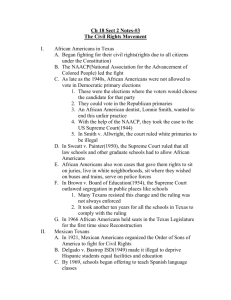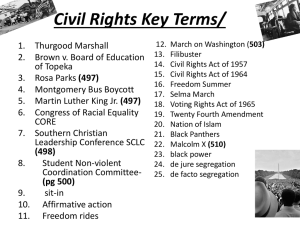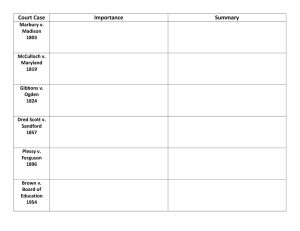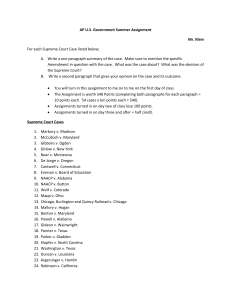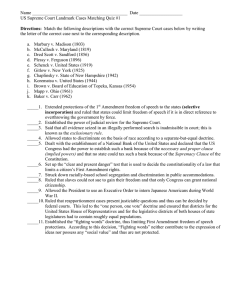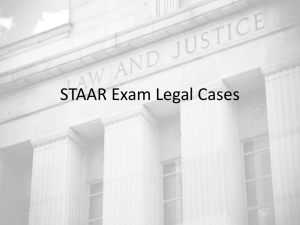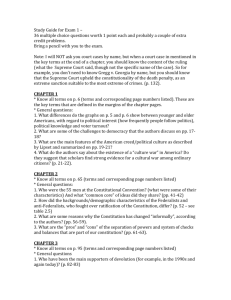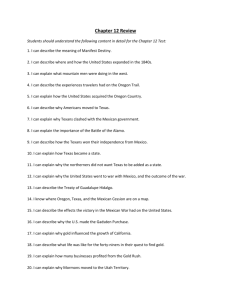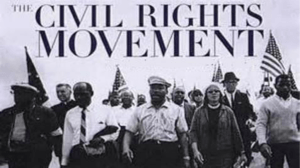LIFE AT THE TURN OF THE 20TH CENTURY
advertisement
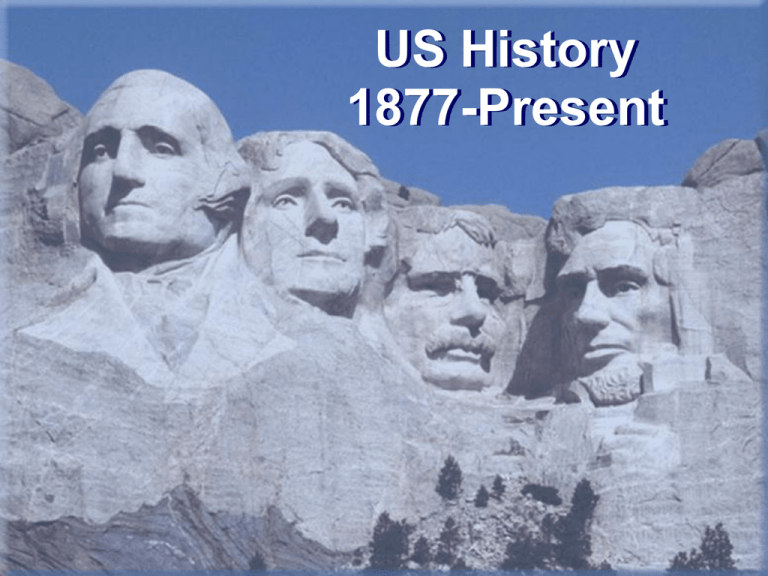
US History 1877-Present Populism • political movement founded in the 1890s representing mainly farmers, favoring free coinage of silver and government control of railroads and other industries Industrialization • the large-scale introduction of manufacturing Labor union • organization of workers formed for the purpose of advancing its members' interest Entrepreneur • One who organizes, manages, and assumes the risk of a business or enterprise. Free enterprise/Free Market • A system of economic exchange in which prices of goods, labor, capital are determined by supply and demand and no producer or consumer dominates the market. Urbanization • rapid growth of cities Philanthropy • providing money to support humanitarian or social goals Isolationism • a national policy of avoiding involvement in world affairs Neutrality • The policy or status of a nation that does not participate in a war between other nations. Progressive Era/Progressivism • A political movement that believed that industrialism and urbanization had created many social problems and that government should take more active role in dealing with these problems. Jane Addams Immigration • To move to a country which is not a person’s native country, usually for permanent residence. Social Darwinism • Adaptation of Charles Darwin’s theory of evolution, this theory held that the “laws” of evolution applied to human life. It promoted the ideas of competition and individualism; it saw as futile any intervention of government into human affairs. Eugenics • The “science” of human breeding, grounded in the Social Darwinist idea that the progress of human evolution is hampered when “unfit” people are permitted to reproduce. Nativism • A preference for native-born people and a desire to limit immigration. Red Scare • A wave of anti-communist, anti-foreign, and anti-labor hysteria that swept over America at the end of WWI. It resulted in the deportation of many immigrants and the violation of civil liberties. Prohibition • Laws banning the manufacture, transportation, and sale of alcoholic beverages. Dictatorship • Form of government in which absolute power is exercised by a dictator. • Examples: – Nazi leader Adolf Hitler – Fascist leader Benito Mussolini – Russian Leader Joseph Stalin Holocaust • Name given to the mass slaughter of Jews and other groups by the Nazis during World War II. War Bonds • War bonds are debt securities issued by a government to finance military operations and other expenditure in times of war. Tuskegee Airmen • The Tuskegee Airmen were a group of AfricanAmerican pilots who fought in World War II. Flying Tigers • The 1st American Volunteer Group (AVG) of the Chinese Air Force in 1941–1942, composed of pilots from the United States' Army Air Forces (USAAF), Navy (USN), and Marine Corps (USMC), recruited under presidential authority and commanded by Claire Lee Chennault. Navajo Code Talkers • During WWII, Native Americans used undecipherable code to relay messages. Truman Doctrine • US commitment to support free people resisting communist attack or rebellion. • Led to monetary aid to the Greek and Turkish governments. Marshall Plan • Massive economic aid program to rebuild the wartorn countries of western European nations. North Atlantic Treaty Organization (NATO) • Military mutual-defense pact formed by the US, Canada, and ten European nations. Berlin Airlift- 1948 • In response to a Soviet land blockade of Berlin, the US carried a massive effort to supply the 2 million Berlin citizens with food, fuel, and other goods by air for more than six months. Containment policy • The policy or process of preventing the expansion of a hostile power. Civil Rights Movement • African Americans’ struggle for equal rights in the 1950s and 1960s. • Leaders: – Martin Luther King Jr – Rosa Parks – Malcolm X Camp David Accords • Peace agreement between the leaders of Egypt and Israel at Camp David. Iran Contra Affair • Officials in the Reagan administration sold arms to Iran using the proceeds to finance the Contra rebels in Nicaragua. This illegal transaction took away congressional power over US funds. Iran Hostage Crisis • 1979- Iranian fundamentalists seized the American embassy in Teheran and held fifty-three American diplomats hostages until 1981. Cold War • The ideological and often confrontational conflict between the US and the Soviet Union between 1946-1990. Persian Gulf War • President Bush and the U.S. led coalition ousted Iraq and Saddam Hussein from Kuwait in 1990. Balkan Crisis • The Break up of Yugoslavia 1991 • Bosnian Serbs “ethnic cleansing” of Muslims • NATO forces cease fire in 1994 vs Klondike Gold Rush • “Gold!” • Words that sent stampeders to the Yukon Territory looking for gold in 1897 Panama Canal • Built across the isthmus of Panama by the United States to provide a short water route between the Atlantic and Pacific Oceans. Dust Bowl • The over farming of fields and droughts of the 1930’s, turned topsoil into dust across the Great Plains. Demographic • of or relating to the study of changes that occur in large groups of people over a period of time based on race, sex, and income. Migration The movement of people from one area to another, generally a permanent move to a new location. Western Expansion Movement of settlers during the East of the United States to the West of the United States in search of land, economic opportunities, and resources. Rural • geographic area that is located in the countryside, outside cities and towns. Great Migration Movement of hundreds of thousands of African Americans during 1910 to 1930 from the South to Northeast and Midwest in search of jobs in the nation’s growing industrial cities such as Chicago and New York . Rust Belt Region consists of areas of the Northeast and Midwest with coal and iron resources. Sun Belt • Region consists of a brad band of states running across the south from Florida to Texas extending west and North to California and the Pacific Northwest. Tin Pan alley • Section of New York City where music like Blues, Jazz and ragtime were mixed together to form American popular music. Harlem Renaissance • African American cultural, literary, and artistic movement centered in Harlem, and area in New York city, in 1920s. Beat Generation • In the late 1950s young poets and novelists such as Jack Kerouac became known as the beats or “beatniks” for their innovative writing and bizarre behavior. They challenged materialism and consumer culture. Chicano Mural Movement • Chicano artists were inspired by the great Mexican muralist Diego Rivera. They began painting murals in barrios throughout the southwest, representing their way of life, culture, religion and politics. New Deal • Roosevelt’s program of legislation to combat the Great Depression. The New Deal included relief, reform, and recovery. World War I 1914-1918 • Assassination of Archduke Ferdinand set off a chain reaction that involved most nations of Europe and later United States (1917). Great Depression 1932-1939 • A devastating economic downturn that saw stock prices fall, businesses fail, and large scale unemployment in America and Europe. World War II 1939-1945 • The most destructive conflict in history in which an estimated 70 million were killed. Hitler launched the war in Europe by invading Poland in 1939. Lobbying • Influencing members of Congress by Special interest groups. Non-violent protest • Civil disobedience • Protesting through nonviolent methods such as: protests, sit ins, marches, boycotts, economic non cooperation Litigation • An action brought in court to enforce a particular right. The act or process of bringing a lawsuit. Laissez-faire • Policy that government should interfere as little as possible in the nation’s economy. Plessy v. Ferguson • Upheld “separate but equal” belief used by Southern states to perpetuate segregation after the Civil War officially ended lawmandated segregation. Brown v. Board of Education • Overruled Plessey v. Ferguson • Abandoned the separate but equal doctrine in the context of public schools. The Supreme Court rejected the idea that equivalent but separate school for African American and white students would be constitutional. Hernandez v. Texas • In Texas, Pete Hernandez was convicted of murder but all the jurors were white. He appealed to the supreme court which ruled that Mexican Americans had the right to have members of their class serve as jurors. Tinker v. Des Moines • John Tinker and his sister were suspended from school for wearing a black armband in protest of the Vietnam war. The Supreme Court ruled that this violated their 1st Amendment rights. Wisconsin v. Yoder • In Wisconsin, Amish children were required to attend school beyond the 8th grade, this went against their religion and way of life. The Supreme Court ruled that this law violated the children’s freedom of religion. White v. Tegester • Texas had two big districts where Mexican Americans and African Americans had little chance of being elected. The Supreme Court ruled that those districts had to be made smaller and that the state had no right to discriminate by setting up multi-member districts.
